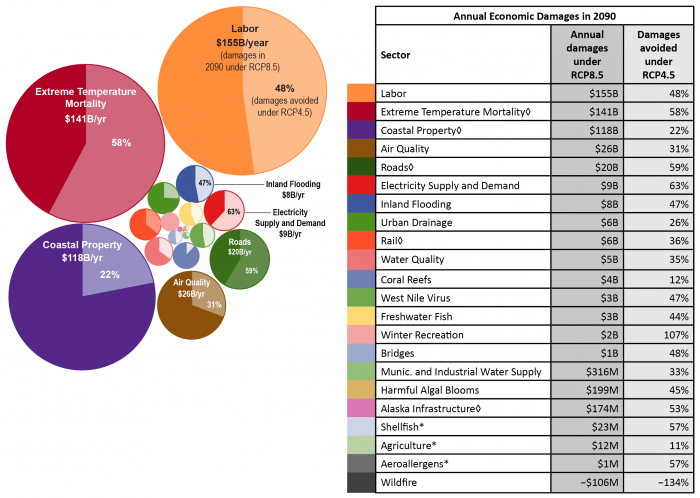Cutting emissions could prevent tens of thousands of heat deaths annually

One of the largest economic costs from unchecked climate change in the United States will arise from premature deaths.
That’s according to the latest National Climate Assessment, a major review of climate risks and responses released last week by a consortium of US federal agencies. A graphic in the final chapter shows that annual economic damages from climate change could add up to nearly $700 billion by 2090, if nations fail to make meaningful changes to address the dangers.
Economic damages from premature deaths due to high heat alone could reach $141 billion a year, under a scenario assuming high greenhouse-gas emissions. While the dangers are often little appreciated, heat waves kill more Americans than hurricanes, tornadoes, and earthquakes combined. High temperatures can lead to heat exhaustion and heat stroke, which can be fatal—particularly among children, elderly people, and pregnant women (see “How to prepare cities and citizens for more killer heat waves”).

Increases in extreme temperatures could lead to more than 9,000 additional premature deaths annually in just 49 large cities by 2100, the report found.
The economic math to calculate the cost of such increased mortality is based on what’s known as the “value of a statistical life,” a standard approach used by US government agencies like the Environmental Protection Agency, says Brian O’Neill, director of research at the University of Denver’s Pardee Center for International Futures and a coauthor of the chapter. It’s a measure, he said in an e-mail, of how much we’re willing to spend to reduce the risk of a death.
Those costs and deaths, however, could be drastically reduced if the world makes rapid progress in cutting greenhouse-gas emissions by shifting to clean energy sources. A medium-emissions scenario could cut costs by 58% and save “thousands to tens of thousands of deaths per year from extreme temperatures,” the report finds.
Deep Dive
Climate change and energy
The problem with plug-in hybrids? Their drivers.
Plug-in hybrids are often sold as a transition to EVs, but new data from Europe shows we’re still underestimating the emissions they produce.
Harvard has halted its long-planned atmospheric geoengineering experiment
The decision follows years of controversy and the departure of one of the program’s key researchers.
Why hydrogen is losing the race to power cleaner cars
Batteries are dominating zero-emissions vehicles, and the fuel has better uses elsewhere.
Decarbonizing production of energy is a quick win
Clean technologies, including carbon management platforms, enable the global energy industry to play a crucial role in the transition to net zero.
Stay connected
Get the latest updates from
MIT Technology Review
Discover special offers, top stories, upcoming events, and more.